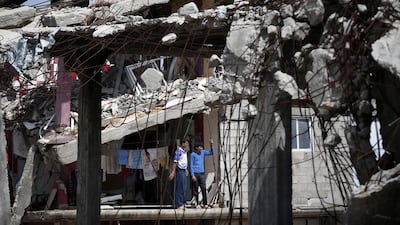For those trying to read developments between Israel and Gaza over the past weeks, the picture has been unusually puzzling.
A month ago, European diplomats and Palestinian officials in the West Bank suggested that Israel and Hamas were taking “baby steps”, as one Palestinian analyst termed it, towards a truce.
Then this month, as an attack linked to ISIL extremists killed dozens in Sinai, an Israeli general accused Hamas of supplying the weapons used against the Egyptian military.
A short time later, a group of Israeli army commanders urged the easing of the near-decade blockade of Gaza as a way to end Hamas’s isolation.
So what’s going on? Does Israel want Hamas weakened or strengthened?
The uncertainty reflects Israel’s increasingly convoluted efforts to “manage” Gaza in the face of the fallout from a series of attacks beginning in late 2008 with Operation Cast Lead and culminating in last year’s Operation Protective Edge.
International activists aboard a humanitarian flotilla failed again last month to reach Gaza and break Israel’s physical siege. But more difficult for Israel is maintaining the blockade on information out of Gaza.
The problem was illustrated this month by a new app from Amnesty International that allows users to map 2,500 Israeli air strikes on the enclave last summer and interpret the resulting deaths and destruction from pictures, videos and testimonies.
The software, says Amnesty, reveals specific patterns of behaviour, including attacks on rescue vehicles and medical workers and facilities.
It allows any of us to turn amateur war crimes prosecutor at the International Criminal Court in The Hague.
The difficulties for Israel of controlling the narrative about Gaza were underscored last week. Judges at The Hague ruled that the court’s chief prosecutor had erred in refusing to investigate Israel for war crimes over the killing of 10 activists aboard an earlier flotilla, in 2010.
Not only does the ruling reopen that episode to scrutiny, but it puts pressure on ICC prosecutors to ensure they investigate Protective Edge thoroughly too.
Meanwhile, frustration at the failure by international institutions to hold Israel to account is driving other ways to punish Israel, notably the grass roots boycott (BDS) movement.
Israel is slowly losing this battle too. The US State Department declared last month that it would ignore the provision in a new trade law passed by Congress that requires the US to protect Jewish settlements from boycotts. In effect, a limited boycott has won the White House’s tacit approval.
The political shock waves from Israel’s rampages in Gaza are being felt in the tiny enclave too. Polls indicate that among a small but growing minority of Palestinians in Gaza support is shifting towards ISIL.
They blame Hamas for failing to capitalise on its relative military success last summer and think that more extreme responses are warranted. Gaza is still ravaged a year on, and continuing Israeli restrictions mean the huge reconstruction project has barely begun.
Israel’s recent confusing behaviour in part reflects a belated realisation that it needs to put out these various fires.
That explains revelations in the Israeli media that Israel is quietly co-operating with The Hague court’s investigators, breaking with its past refusal to deal with international inquiries. It hopes to forestall an ICC investigation by demonstrating that it is taking action itself.
Last week, Israel announced that it would investigate soldiers’ testimonies of war crimes collected by the whistle-blowing group Breaking the Silence. Just last month, the government had called the group traitors.
In addition, Neria Yeshurun has become the first senior commander to be placed under investigation, accused of shelling a Palestinian medical centre as “revenge” after a fellow officer was killed.
Some Israeli commanders argue that it is time to help Gaza by easing – if only marginally – the blockade.
None of this is being done from conscience or out of a recognition of Palestinian rights. According to Israeli analysts, a dual policy is being pursued.
On the one hand, Israel needs to placate the international community and ordinary Palestinians in Gaza. Diplomatic gains will help rehabilitate Israel’s image and bolster Hamas’ political wing against more threatening newcomers like ISIL.
On the other, Israel is as keen as ever to sow divisions wherever possible. The Israeli government’s repeated likening of Hamas and ISIL, and the recent suggestions of military ties between the two in Sinai, are intended to remind the international community of the threat Hamas’s military wing poses to regional order.
Further, it is better for Israel that Hamas’s commanders contend with Egyptian displeasure too, and that tensions between Hamas’s political and military wings are accentuated.
Israel’s compulsive need to dominate Palestinians trumps all, even as it finally dawns on a few of its generals that Israel’s endless immiseration of Gaza is no policy at all.
Jonathan Cook is an independent journalist in Nazareth
On Twitter: @jonathan_k_cook


